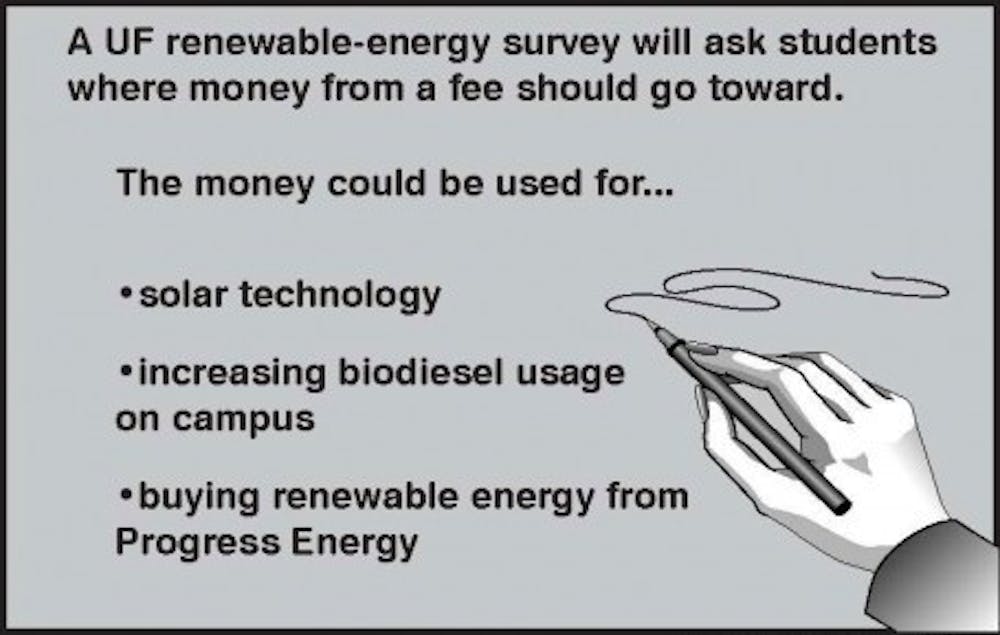Although it has been approved by the UF students, the renewable energy fee still has to get by a long list of officials before it can become a reality.
During Student Government elections last spring, 78 percent of students voted for a renewable energy fee, which calls for a 50-cent-per-credit-hour tuition increase to be used for renewable energy on campus.
Although it has been approved by the UF administration, the fee must pass through the Board of Trustees, then the Florida Legislature and then, possibly, the Florida Board of Governors before it is enacted.
Kelly Moosbrugger, an intern at UF's Office of Sustainability, is spearheading efforts to get the fee enacted with Gators for a Sustainable Campus.
She is sending out a survey in the next few weeks to see how students would be most interested in using the money.
She said she hopes to present the fee at a Board of Trustees meeting early next spring.
Although the administration approved the fee, administrators want to make sure they know exactly how they will use the fee before they present it to the Board of Trustees.
"The students want to do this to improve the environment at UF and to make a statement of its importance," said UF President Bernie Machen. "If it comes to me with their support, I will endorse it."
After the students voted in favor of the fee last spring, it was taken to the Student Senate, which passed a resolution in support of the fee this semester.
Ryan Moseley, Student Body president and a member of the Board of Trustees, said the road to getting the fee enacted will be a long one.
While waiting for the fee to make its way up the chain of command, SG is not "sitting on their laurels," he said.
The university has already contracted with RTS to get buses to switch to biodiesel fuel, which will start the next school year, Moseley said.
They have discussed putting solar panels up to light the various fields on campus, he said.
After students vote through the survey on the best uses of the money, Moosbrugger said they will go back to the administration with the results.
"They want to make sure we have everything covered," she said. "That's why we're doing the survey. That's why we did the forum. All these things are really helpful."
Moosbrugger said they want to see how students think the money from the fee could best be used. There are five areas on the survey that students can vote for.
The first area it could be used for is solar technology.
With solar technology, the university could thermally heat its water, use solar panels on the roofs of buildings to generate heat or use solar panels on the parking garages and fields to provide energy for lighting.
The money can also be used to convert waste to energy.
Ann Wilkie, an associate professor in the College of Agricultural and Life Sciences, is working with an anaerobic digester - a living organism which digests material - to turn sludge and trash on campus into methane gas, which can be converted into electricity.
Retrofitting the buildings, changing out old windows, lighting and air conditioning units to make them more efficient, is another option.
Moosbrugger said the fee could also be used to increase biodiesel production on campus.
The final use of the money could be to simply purchase renewable energy from Progress Energy, which provides the campus with energy.
In October, Moosbrugger met with other schools in the state to help universities to become more environmentally friendly.
She said UF is ahead of most schools, which are still getting petitions signed by students.
UF needed 500 students to sign a petition to get the fee on the SG electoral ballot in spring, whereas the University of Central Florida needs 5,000 signatures before it can move forward.
Still, it is farther behind other schools in the nation that have already successfully adopted and implemented renewable energy fees of their own.
In 2004, 82 percent of Harvard University students voted in favor of a ,10-per-student-per-term tuition increase that would pay for wind power, stated the Harvard Crimson, the student paper.
In 2005, the Board of Trustees at Western Washington University voted in favor of a student fee allowing its university to purchase energy from renewable sources.
That fee called for a ,19-per-student-per-quarter tuition increase and was approved by almost 85 percent of students, stated an article from Western Washington University's University Communications.
Meanwhile, Moseley said UF is continuing to develop its resources.
"Any time you try to enact a fee in the state of Florida, especially with this conservative government, you have to be patient," Moseley said.






